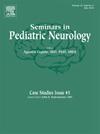结节性硬化症复合体:诊断特征、监控和治疗策略。
IF 2.1
4区 医学
Q2 CLINICAL NEUROLOGY
引用次数: 0
摘要
结节性硬化症综合征(TSC)是一种罕见的神经皮肤疾病,是由 TSC1 或 TSC2 基因的致病变异导致的 mTOR 通路失调引起的。这种疾病的表现可能涉及大脑、肾脏、心脏、肺部、眼睛、皮肤、骨骼和牙齿等组织的异常生长和功能障碍。神经系统表现可能包括独立髓下巨细胞星形细胞瘤(SEGAs)、高发的婴儿痉挛症、耐药性癫痫、发育迟缓、认知障碍、自闭症谱系障碍和其他神经行为表现。在此,我们按系统回顾了 TSC 的潜在临床表现、推荐的诊断和监测检测、基因检测、目前可用的治疗方案,以及考虑到这种多系统疾病的独特挑战而对教育和社会支持资源的考虑。本文章由计算机程序翻译,如有差异,请以英文原文为准。
Tuberous sclerosis complex: Diagnostic features, surveillance, and therapeutic strategies
Tuberous sclerosis complex (TSC) is a rare neurocutaneous disorder of mTOR pathway dysregulation resulting from pathogenic variants in the TSC1 or TSC2 genes. Expression of this disorder may involve abnormal tissue growth and dysfunction within the brain, kidneys, heart, lungs, eyes, skin, bones, and teeth. Neurological manifestations can include subependymal giant cell astrocytomas (SEGAs), high rates of infantile spasms, drug-resistant epilepsy, developmental delay, cognitive impairment, autism spectrum disorder, and other neurobehavioral manifestations. Here we review the potential clinical manifestations of TSC by system, recommended diagnostic and surveillance testing, genetic testing, currently available therapeutic options, and considerations for education and social support resources given the unique challenges of this multi-system disorder.
求助全文
通过发布文献求助,成功后即可免费获取论文全文。
去求助
来源期刊

Seminars in Pediatric Neurology
CLINICAL NEUROLOGY-PEDIATRICS
CiteScore
4.80
自引率
0.00%
发文量
38
审稿时长
84 days
期刊介绍:
Seminars in Pediatric Neurology is a topical journal that focuses on subjects of current importance in the field of pediatric neurology. The journal is devoted to making the status of such topics and the results of new investigations readily available to the practicing physician. Seminars in Pediatric Neurology is of special interest to pediatric neurologists, pediatric neuropathologists, behavioral pediatricians, and neurologists who treat all ages.
 求助内容:
求助内容: 应助结果提醒方式:
应助结果提醒方式:


